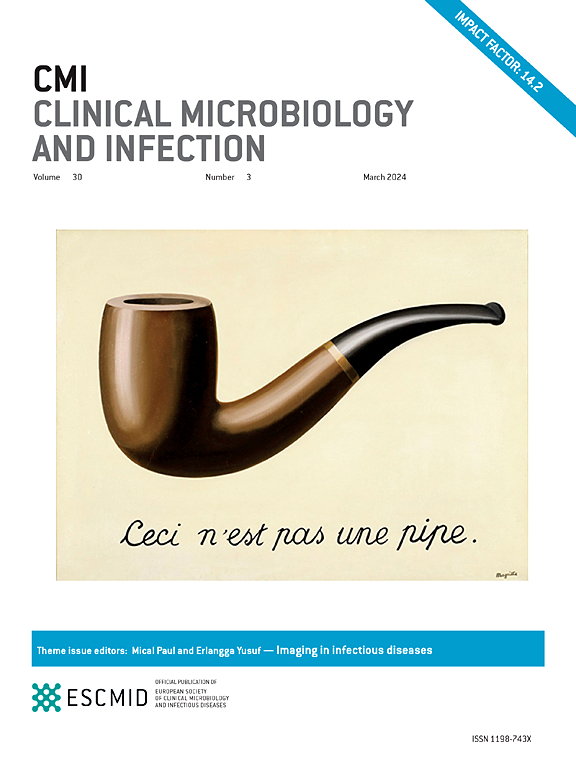fda批准的根据说明书使用的快速抗原SARS-CoV-2检测的批准前和批准后诊断测试准确性:系统回顾和荟萃分析
IF 8.5
1区 医学
Q1 INFECTIOUS DISEASES
引用次数: 0
摘要
背景:制造商在产品标签上声称快速抗原SARS-CoV-2检测灵敏度高,但系统评价报告灵敏度低得多。目的:描述研究特点,比较美国食品和药物管理局(FDA)批准的快速抗原SARS-CoV-2检测在批准前和批准后的敏感性和特异性。方法:系统评价和荟萃分析。数据来源:FDA网站,Medline, Embase,谷歌Scholar。研究资格标准:根据使用说明书进行诊断试验准确性研究。参与者:有covid -19症状的患者。检测方法:快速抗原SARS-CoV-2检测。参考标准:逆转录酶聚合酶链反应。偏倚风险评估:QUADAS-2工具。数据综合方法:双变量二项正态限制最大似然随机效应荟萃分析和应用delta方法和似然比检验的元回归。结果:我们确定了61项快速抗原检测中的13项(21%)的批准后研究,其中9项检测符合条件。该分析纳入了13项批准前研究(591例COVID-19病例,3155名受试者)和26项批准后研究(2765例,12444名受试者)。批准前和批准后研究的总敏感性分别为86.5% (95% CI: 83.3-89.1)和84.5% (95% CI: 81.2-87.3)。敏感性和特异性的绝对差异分别为2.0% (95% CI: -1.9 ~ 6.2)和0% (95% CI: -0.6 ~ 0.6)。在批准后的研究中,9项检测中的2项灵敏度较低。讨论:我们的研究发现,fda批准的快速抗原检测在批准后的敏感性估计与制造商的估计在很大程度上是一致的。然而,对于9个测试中的2个,批准后的敏感性低于制造商的高估计。在先前的系统评价中观察到的敏感性差异可能是由于研究人群的差异,而不是研究行为的偏差。鉴于fda批准的快速抗原检测中有79%缺乏批准后的研究,需要进行持续的评估以确保与临床期望保持一致。注册:本研究已预注册,方案可在https://osf.io/97cft上获得。本文章由计算机程序翻译,如有差异,请以英文原文为准。
Preapproval and postapproval diagnostic test accuracy of food and drug administration–authorized rapid antigen SARS-CoV-2 tests used according to instruction: a systematic review and meta-analysis
Background
Manufacturers claim high sensitivity for rapid antigen SARS-CoV-2 tests on product labels, yet systematic reviews report considerably lower sensitivity.
Objectives
This study aimed to describe study characteristics and compare the sensitivity and specificity of United States Food and Drug Administration (FDA)-approved rapid antigen SARS-CoV-2 tests in preapproval vs. postapproval studies.
Methods
Methods include systematic review and meta-analysis.
Data sources
Data sources include FDA website, Medline, Embase, and Google Scholar.
Study eligibility criteria
Study eligibility criteria include diagnostic test accuracy studies according to the instruction for use.
Participants
Participants include patients with symptoms of COVID-19.
Tests
Test includes rapid antigen SARS-CoV-2 tests.
Reference standard
Reference standard includes RT-PCR.
Assessment of risk of bias
Assessment of risk of bias was conducted using the Quality Assessment of Diagnostic Accuracy Studies 2 (QUADAS-2) tool.
Methods of data synthesis
Methods of data synthesis include bivariate binomial-normal restricted maximum likelihood random-effect meta-analysis and meta-regressions applying the delta method and likelihood-ratio tests.
Results
We identified postapproval studies for 13 of 61 (21%) rapid antigen tests, of which nine tests had eligible studies. The analysis incorporated 13 preapproval studies (591 patients with COVID-19, 3155 participants) and 26 postapproval studies (2765 patients with COVID-19, 12 444 participants). The pooled sensitivity for preapproval and postapproval studies was 86.5% (95% CI: 83.3–89.1%) and 84.5% (95% CI: 81.2–87.3%), respectively. The absolute difference was 2.0% (95% CI: −1.9% to 6.2%) and (0%, 95% CI: −0.6% to 0.6%) for sensitivity and specificity, respectively. Two of the nine tests had lower sensitivity in postapproval studies.
Discussion
Our study found that sensitivity estimates from postapproval studies on FDA-approved rapid antigen tests are largely consistent with manufacturers' estimates. However, for two of the nine tests, postapproval sensitivity was lower than the manufacturers' high estimates. Differences in sensitivity observed in prior systematic reviews likely result from variations in study populations, not bias in study conduct. Given that 79% of FDA-approved rapid antigen tests lacked postapproval studies, ongoing evaluations are needed to ensure alignment with clinical expectations.
求助全文
通过发布文献求助,成功后即可免费获取论文全文。
去求助
来源期刊
CiteScore
25.30
自引率
2.10%
发文量
441
审稿时长
2-4 weeks
期刊介绍:
Clinical Microbiology and Infection (CMI) is a monthly journal published by the European Society of Clinical Microbiology and Infectious Diseases. It focuses on peer-reviewed papers covering basic and applied research in microbiology, infectious diseases, virology, parasitology, immunology, and epidemiology as they relate to therapy and diagnostics.

 求助内容:
求助内容: 应助结果提醒方式:
应助结果提醒方式:


